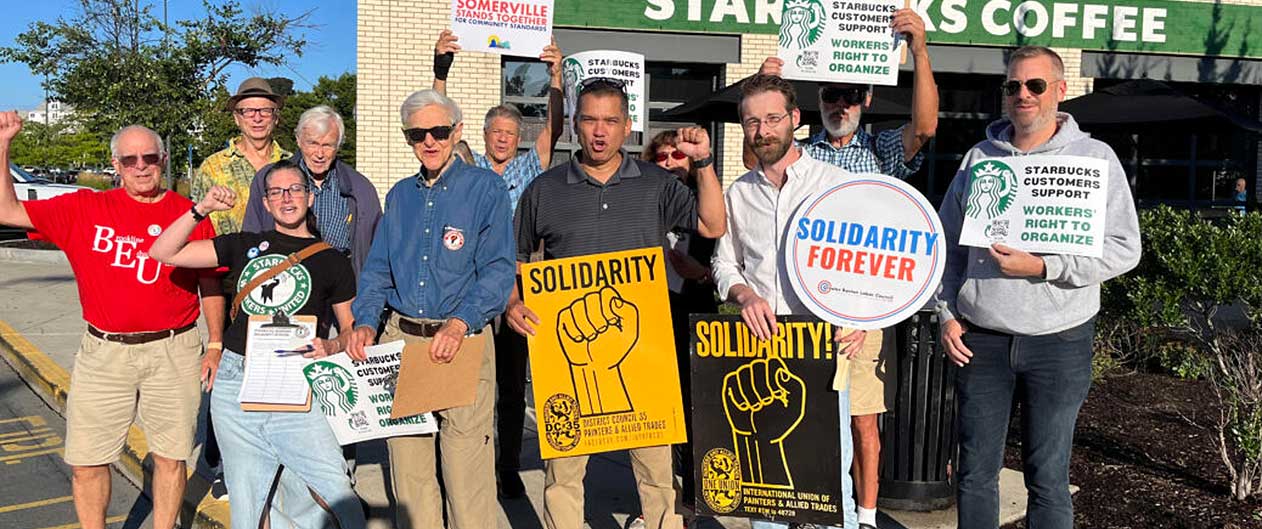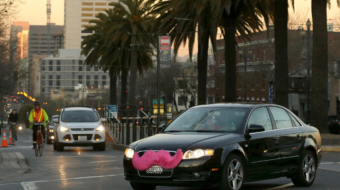
NEW YORK—A new report shows 28 states and Washington, D.C., have surpassed the “Fight for $15” minimum wage, even if the wins conveniently don’t mention the last half of that longtime demand, “and a union.” The progress made, in reaching and surpassing the $15 goal, however, by no means signals the end of the fight for living wages by millions of workers across the country. Some 22 states still stick with the $7.25 federal minimum wage.
“On Jan. 1, 2024, the minimum wage increased in 22 states and 43 cities and counties,” National Employment Law Project analyst Yannet Lathrop reports. Some of those hikes came on top of prior increases.
“In 47 of those jurisdictions, the wage floor will reach or exceed $15 per hour for some or all employees, including one state and 26 localities where the wage floor will reach or exceed $17 per hour for some or all employers.”
“Later in 2024, three states and 22 local jurisdictions will likewise lift their wage floors—20 of them to $15 or more for some or all employers, including 15 localities which will reach or exceed a $17 minimum for some or all employers,” Lathrop adds.
Of course, the fight for higher pay for the nation’s lowest-paid most-exploited workers isn’t complete. The other 22 states still adhere to the federal minimum wage of $7.25 an hour, NELP noted. And that’s unchanged since 2009.
And Southern states, as well as deep-red Mountain and Plains states, are notably absent from NELP’s compilation of wage hikes.
“These increases are the result of underpaid workers organizing, demanding, and winning higher wages over the past decade,” Lathrop writes. “This worker movement has not only led to the adoption of higher state and local minimum wages—it has also helped seed new worker activism and mobilization across our economy and led to greater equity for workers of color.”
Campaigns for further hikes in 2024 have already begun, Lathrop reports. The one in California has succeeded: An initiative raising the Golden State’s minimum wage to $18 an hour by 2025-26 will be on this fall’s ballot.
Even so, the California minimum falls short of the current minimum wage for all workers in West Hollywood ($19.08), Berkeley ($18.07) and Emeryville ($18.67), and for hotel workers in Santa Monica ($19.73). And Sea-Tac, Wash.—the airport—now has a $19.71 minimum for all workers except tipped workers ($19.07).
The minimums in West Hollywood and Santa Monica may actually be higher, Lathrop reported. That’s because those two cities, like most of the other state and local minimum wage ordinances, then tie future minimum wage hikes to increases in the Consumer Price Index. And the two California cities added the CPI to their current minimums.
California’s new campaign is on top of prior hikes for some of its lowest-paid workers, in fast food ($20/hour) and health care ($25/hour), which the heavily pro-worker legislature passed and Democratic Gov. Gavin Newsom signed last year—though now he’s backtracking on the health care workers’ hike.
That increase would put $4 billion more in workers’ pockets over four years for employees whose institutions get state funding or are government-run. Newsom says the state budget is running deeply in the red and it can’t pay that increase. The Democratic House Speaker, a key supporter of the raise, is skeptical and says wait until better budget numbers are unveiled in May.
Some of the states and cities, led by Chicago, also enacted increases in the tipped minimum wage. The tipped minimum is the wage tipped workers, such as restaurant servers, now receive, with tips supposedly making up the difference between that and the regular minimum wage—or more.
In practice, the tipped minimum has often left workers with $0.00 paychecks after deductions and before tips, because the federal tipped minimum, of $2.13 an hour, hasn’t risen since the Reagan administration.
In Chicago, the tipped minimum would reach parity with the city’s regular minimum wage—now $15.80 for large employers and $15/hour for small shops—by 2028. Chicago’s tipped wage is now $9.48 hourly for workers in large shops and $9 for workers in smaller enterprises.
Then there’s the weird situation in Michigan. Voters actually approved a minimum wage hike six years ago, in a referendum, but the then-Republican-run legislature blocked it.
So now there’s a ballot campaign for a 2024 ballot initiative for $15/hour by 2027 and one fair wage—raising the tipped minimum–by 2028, Lathrop reports. At the same time, “A lawsuit challenging the decision of 2-2 party-line vote by Board of Canvassers to block the initiative from appearing on 2024 ballot has been filed.
“Separately, there is ongoing litigation challenging the ‘adopt and amend’ tactic” the legislature used six years ago “to gut a 2018 minimum wage petition that had gathered the required signatures.” That case is pending at the state Supreme Court.
New York raised its minimum wage last year, but lawmakers in Albany are already discussing building on that hike. Meanwhile, there’s a “one fair wage” campaign for legislation already introduced to aid the tipped workers through increases in their minimum “by 2027 in New York City and Nassau, Suffolk, and Westchester Counties, and by 2028 upstate.”
We hope you appreciated this article. At People’s World, we believe news and information should be free and accessible to all, but we need your help. Our journalism is free of corporate influence and paywalls because we are totally reader-supported. Only you, our readers and supporters, make this possible. If you enjoy reading People’s World and the stories we bring you, please support our work by donating or becoming a monthly sustainer today. Thank you!










